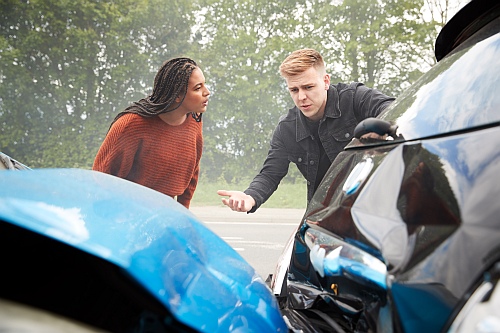Successfully asserting negligence claims against the State or a municipality can be a difficult task. However, success is possible. In a recent decision, City of Atlanta v. Kovalcik (PDF-embedded link), the Georgia Court of Appeals affirmed the denial of summary judgment in a negligence suit brought against the City of Atlanta for its failure to maintain adequate lighting at a newly redesigned intersection where the daughter of the plaintiffs was involved in a fatal car accident.
The car accident at issue in this case occurred on a night in March 2008. However, the events leading to this accident began four years earlier. In February 2004, the Georgia Department of Transportation and the City of Atlanta entered into an agreement to undertake certain improvements, including a project to redesign a portion of Peachtree Road in Atlanta. In pertinent part, the agreement provided that the city would accomplish the design activities in accordance with Georgia Department of Transportation (“DOT”) guidelines and that the DOT would “review and has approval authority for all aspects of the Project provided however this review and approval does not relieve the City of its responsibilities under the terms of this agreement.” Pursuant to a separate agreement between the City of Atlanta and the Buckhead Community Improvement District (“BCID”), BCID retained URS Corporation to develop construction plans, including road design, signage, pavement markings, curbs, traffic signals, and landscaping. These plans were ultimately approved by the DOT. Following approval of the plans, the DOT awarded a construction contract to Infrasource Paving and Concrete Services and contracted with Parsons Brinkerhoff Shuh & Jernigan for other construction, engineering, and inspection services. Active construction on this project ended in October 2007, and a final inspection was performed in January 2008.
On the aforementioned night in March 2008, a vehicle containing the daughter of the plaintiffs in this case approached the intersection of Peachtree Road and Piedmont Road. The driver was heading south on Peachtree and intended to turn left onto Piedmont. The driver entered what he believed was the left hand turn lane, but it was now a short left hand turn lane preceding the intersection constructed for drivers to turn into a nearby parking lot. A concrete divider bounded the short turn lane, and when the driver was navigating the turn, contact with the divider allegedly caused the vehicle to roll. Several newly installed streetlights at the intersection were not illuminated at the time of the accident. The plaintiff’s daughter died from injuries sustained in the crash, and her parents brought suit against the City of Atlanta, the DOT, BCID, and several others. At the close of discovery, the City of Atlanta brought a motion for summary judgment, arguing that it was not involved in the design, construction, or inspection of the intersection and that the street lighting was not under its purview at the time of accident. In a terse order, the trial court denied the motion for summary judgment, and the City brought this appeal.
The Court of Appeals, however, found the city’s various arguments on appeal unavailing and affirmed the trial court’s decision. First, the court addressed the city’s argument that defective lighting cannot give rise to liability on the part of the city unless there is an underlying road defect. In support of this argument, the city relied on Roquemore v. City of Forsyth, in which the Court of Appeals noted that “the decision whether to provide lighting on a particular city street is a discretionary function of a municipality” and held that “neither the absence of lights nor defective lights is in itself negligence, but is only evidence on the principal question, whether, at the time and place where an injury occurred, the streets were in a reasonably safe condition.” 274 Ga. App. 422 (617 SE2d 644) (2005). However, the Court of Appeals held that reliance on this decision was misplaced in this case. First, there was evidence of a defect in the road, considering the unclear signage at the site of the short turn and the newly constructed turn’s atypical design. Indeed, an investigating police officer noted evidence of several other curb strikes at the same short turn. Furthermore, unlike the situation presented in Roquemore, there was evidence the city knew or should have known the lights weren’t operational. Thus, the negligence in this case wasn’t predicated on the absence of light alone, but rather its role with respect to the question of whether the road was maintained in a reasonably safe condition.
The city’s second argument concerned whether the trial court had impermissibly deferred the legal question about whether a duty of care exists to the jury. The court, however, read the trial court’s order to provide that the judge was merely reserving a factual question regarding whether the city had, in fact, assumed responsibility for lighting despite the absence of a legal duty to do so. Finally, the city argued that there was an absence of evidence showing that the city had, in fact, assumed responsibility for lighting at the intersection. However, the court noted that the record showed evidence that the city would assume responsibility for lighting at the intersection upon the completion of the project, that the city considered the intersection safe for motorists when it was opened in October of 2007 without functioning lights, and that at the time of the accident the lighting was ready to be powered and simply needed to be entered into the city’s billing account with the power company to be functional. Accordingly, the Court of Appeals affirmed the trial court’s denial of summary judgment, leaving the city’s ultimate responsibility for a jury to decide.
Although the plaintiffs in this case still need to prove liability to a jury, the Court of Appeals decision remains a major victory, since many claims against municipalities and the state are lost in the preliminary stages to trial. Although it is difficult, one can hold a government entity responsible for acts or omissions that lead to harm. If you’ve recently been harmed as a result of possible negligence on the part of a city or the state and are curious about the options you have for recovery, you would be well served to consult the guidance of counsel knowledgeable in government liability claims. The Atlanta negligence attorneys at the Law Office of Terrence R. Bethune have experience with government liability claims, including claims related to road hazards, and are prepared to provide this guidance. Feel free to contact us if you are interested in a free case consultation.
Related Posts:
Court of Appeals Reverses in Nuisance Case Against City of Atlanta
Negligent Inspection Claim on Georgia County Road
Court of Appeals Reverses in High-Speed Chase Nuisance Suit
Subject Related Articles

Navigating Macon Car Accident Claims: Step-by-Step Guide
You’ve been in a Macon car accident, and now you’re faced with insurance claims, police reports, car repairs, and more. It can feel overwhelming trying
June 24, 2024

Avoid These Mistakes After a Car Accident in Carrollton
You’ve just been in a car accident in Carrollton. Even minor fender benders can be stressful events. But before you step out of the car
May 20, 2024

What to Do After a Hit-and-Run Accident
So you’ve just been in a hit-and-run accident. Your first thought is probably to chase down the other driver, but that may not be the
April 19, 2024





